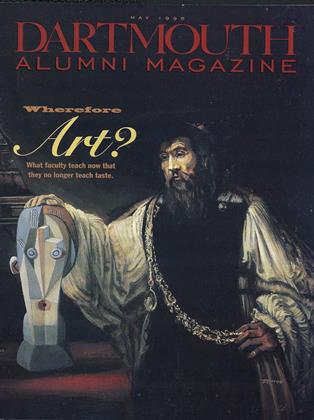An every-issue guide to staying in touch with Dartmouth
The mission of the administrators who serve in the College's Development and Alumni Relations department, says Nelson Armstrong '71, director of Alumni Relations, is to "work as hard as possible to get as many alumni as possible to be engaged with Dartmouth." He adds that tliere are more avenues today to achieve this than there were 20 or 30 years ago-and more need. "The College is much less homogeneous than it was in the past, reflecting the era we live in," he says, "further, the D Plan has led to somewhat less class activity and more affinity-oriented friendships that transcend' class numerals."
The consequence of these changes is that the College, through the Alumni Relations office, now supports the activities, of a handful of alumni associations representing interests that are more vertical than the broader, horizontally on nized class associations and clubs that'continue to occupy most of Alumni Relations resources. At the moment the College recognizes—and Armstrong's troops support—five of these alumni, groups:
The Black Alumni of Darmouth Association President: Morris'Whitaker '74 Dartmouth Gay and Lesbian Alumschair: Lee A.M.V. Merkle '86 The Ernest Martin Hopkins instituteChair, William B. Modahl '60Dartmouth Lawyers AssociationPresident: Gary T. Brooks '70 Native American Alumni AssociationChair: Arvo Mikkanen '83
Interested alumni can contact the presidents or chairs of these groups via Alumni Relations, 304 Blunt, Hanover NH 03755. You can also e-mail the office: .
Armstrong suggests that there may be perhaps two additional associations in die not-too-distant future, for Latin Americans and for Asian Americans. Long-range, he hopes there will be less need for interest- and professional-affinity alumni bodies. This could happen if students' Dartmouth experiences become more homogeneous and if their diverse voices are therefore better heard throughout the alumni body. He believes that if the; mainstream is strengthened there will be less need for a variety of subsets. He insists that alumni who choose to rally around affinity groupings are "part of the Dartmouth family. When they support their vertical groups they're giving back, they're supporting the whole family."'
Nels Armstrong wants it understood that the affinity groups listed here operate side-by-side with so-called Friends groups that have existed for some time, but without the direct support of Alumni Relations. Included among these are associations connected with the Hopkins Center/Hood Museum, with sports and outdoor programs, and with religious and music activities.
The Dartmouth Club of Washington's ninth annual Daniel Webster Award for public service recently went to Ira Michael Heyxnan '51, secretary of the Smithsonian Institution, former chairman of Dartmouth's Board of Trustees, and former chancellor of U.C. Berkeley.
 View Full Issue
View Full Issue
More From This Issue
-
 Cover Story
Cover StoryWha is There to Teach About Art?
May 1996 By Rebecca Bailey -
 Feature
FeatureThe Art of Collecting
May 1996 By Diane Cyr -
 Feature
FeatureA Mini-Seminar On Two Hood Pieces
May 1996 -
 Feature
FeatureGuardian of Halos
May 1996 By Carl Little '76 -
 Feature
Feature9 Reasons Why the Hood Bought This Painting
May 1996 -
 Article
ArticleVisions of the Ancestors
May 1996 By Karen Endicott







